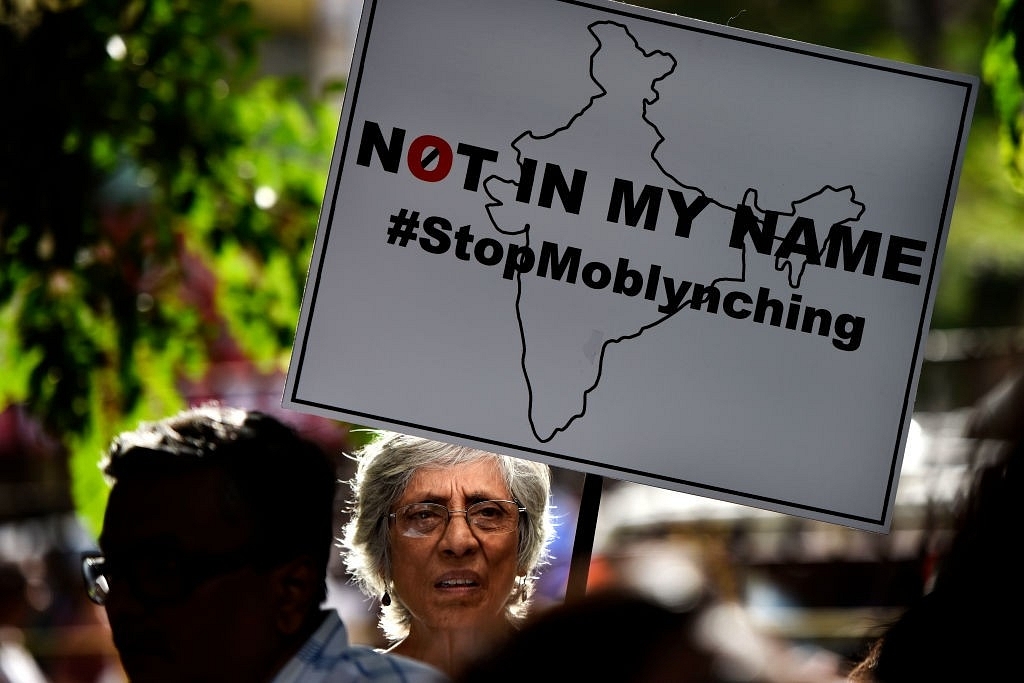Politics
Answer To Mob Lynching Lies In Independent Police Machinery, Not In New Laws
- What the apex court asked the government to do: consider creating a law against mob lynching.
- What might work better: better enforcement of existing laws.

People participating in anti-lynching protest in Mumbai. (Pratik Chorge/Hindustan Times via Getty Images)
According to this report in The Economic Times, the Supreme Court of India today asked the government and Parliament to consider creating a law against lynching. The report mentions that the apex court criticised the government for its failure to stop mob-lynching incidents, and said that the onus lies on both the Centre and state governments to check these incidents and create law against lynching.
But is legislation the right solution to the problem of mob lynching in India or does the solution lie elsewhere? To check mob lynching, do we need new laws or do we need better law enforcement?
According to the available data mob violence is not uncommon in India, and the primary reason is unrelated to the party in power at the Centre or states. The primary reason is the lack of reform in the law and justice sphere, with police reform being the main missing element in this jigsaw, as Arvind Virmani, former chief economic adviser, has been pointing out repeatedly.
Here’s the point: when the police will not enforce the law, or enforce it only when it suits the party in power, mobs – or rogue elements – will sometimes take law into their own hands.
There are two underlying reasons why this is so.
First, no politician in any state is willing to let the police follow the law, or give the police institutional independence even though the Supreme Court has ordered states to do this more than 10 years ago (in 2006, to be exact). In every state, the top levels of the police are manned by officers who are in tune with their political bosses. They know their jobs depend on pandering to what their bosses want, and not just by upholding the law.
Second, politicians deliberately make laws that they know cannot be implemented, or make them in ways where implementation is not required.
Take the case of cow slaughter, which is banned in over 18 states.
Politicians know that it is impractical to ban all kinds of cow slaughter, for old cows do indeed need to be slaughtered, unless the state will buy them off the hands of farmers or the dairy industry.
So the law has been made to address Hindu sentiment, but practical politics requires you to allow clandestine cow slaughter.
An independent police system is duty-bound to stop cow slaughter, for this is the law in most states. But their bosses will tell them to not be too conscientious in this area, since they don’t want to stamp out businesses that depend on illegal slaughter, and also in order to allow protection rackets to flourish and bring in private revenues to politicians.
So the gau rakshak lynchings, even if we assume they are surfacing more now, are also indirectly linked to the lack of law enforcement on cow slaughter.
The only way to fix the problem of mob justice is to start with police reform.
This means the top levels of policemen need to be depoliticised, by making the selections relatively apolitical and independent. At best, the political authorities should be given two or three options for choosing police chiefs by an independent police commission; alternatively, police bosses should be chosen something like the vigilance chief: with the chief justice of the high court, the chief minister and the state opposition leader forming a three-men panel for final selection.
A related change is an expansion of the police forces in all states. India, given its size, is the most under-policed major country in the world, with police personnel per one lakh population as low as 119, as against the US’s 284, Germany’s 296 and France’s 340.
India can easily double its police forces without making the country overpoliced.
A larger police force also means that some of the more draconian laws can be made less stringent. One consequence of having a relatively small police force is that it needs stronger laws to do its job in a crisis.
Mobs and thuggish elements are wading in to deliver their brand of justice largely because the police force is too meagre or too politicised to do its job.
An earlier version of this piece was published on 28 June 2017 as ‘Roots Of Mob Violence Lie In Lack Of Police Reform, Not In BJP’s Rise To Power’.
Support Swarajya's 50 Ground Reports Project & Sponsor A Story
Every general election Swarajya does a 50 ground reports project.
Aimed only at serious readers and those who appreciate the nuances of political undercurrents, the project provides a sense of India's electoral landscape. As you know, these reports are produced after considerable investment of travel, time and effort on the ground.
This time too we've kicked off the project in style and have covered over 30 constituencies already. If you're someone who appreciates such work and have enjoyed our coverage please consider sponsoring a ground report for just Rs 2999 to Rs 19,999 - it goes a long way in helping us produce more quality reportage.
You can also back this project by becoming a subscriber for as little as Rs 999 - so do click on this links and choose a plan that suits you and back us.
Click below to contribute.
Latest